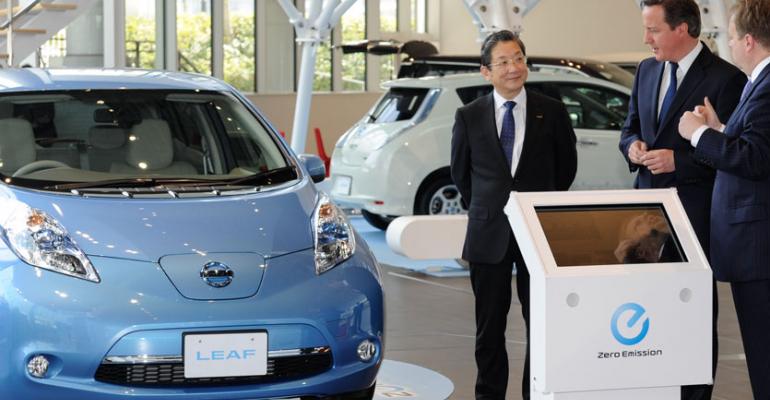DETROIT – The auto industry needs to agree on a standard connector for 480V DC “quick charging,” Nissan’s chief operating officer says.
“Deployment of quick chargers is critical to increase mainstream adoption of electric vehicles,” Toshiyuki Shiga tells attendees of the recent SAE World Congress here.
“Within SAE there appears to be difference of opinion on standard connectors using quick chargers,” Shiga notes.
There are at least three different quick-charge connector designs. CHAdeMo is favored by Japanese auto makers including Nissan, and Shiga is the organization’s president. European auto makers are promoting a second connector design, and the SAE has issued a proposal for a common connector for 240V and 480V charging.
SAE reportedly will publish its DC quick-charge standard by August, which is expected to diverge from CHAdeMO.
“Though the connector is an important component, we must not forget that the remaining 95% of the cost associated with charging equipment is also at stake,” Shiga says of the quagmire.
Despite the industry impasse, certain municipalities are moving ahead with quick-charge installations.
California and NRG Energy announced in March a plan to install 200 DC CHAdeMo chargers throughout major metro areas of the state as part of a $100 million, 4-year plan.
Quick-charging, also known as Level 3 charging, can replenish an electric car battery in a half hour or less. Level 1 (120V) and Level 2 (240V) charging can take six to 12 hours.
Shiga reiterates Nissan’s commitment to zero-emission vehicles such as the all-electric Leaf, during his speech.
“Our profound belief (is) that zero-emission vehicles are necessary for society and the human race as a whole,” he says.
Nissan expects EVs to make up 10% of global auto-industry sales and Nissan’s market share by 2020.
As of late March, the auto maker has sold 27,000 Leafs worldwide, which Shiga notes makes the car the industry’s best-selling EV.
Nissan plans an all-electric car for its Infiniti luxury brand, previewed in the LE concept unveiled at this month’s New York auto show; an EV version of its NV200 small light-commercial van; and a possible range-extended EV sports car for Infiniti, previewed in the Geneva motor show Emerg-e concept.
Shiga arrived in Detroit off a visit to Nissan’s under-construction lithium-ion battery plant in Smyrna, TN. The facility will supply batteries for the Leaf also to be built in Smyrna. He says battery production will begin this fall and Leaf output will commence at Smyrna in December.
Nissan also will assemble the Leaf and its battery pack at its Sunderland, U.K., plant beginning next year.
Currently, the only source of the Leaf is Nissan’s Oppama, Japan, plant. CEO Carlos Ghosn, speaking at the New York auto show four weeks ago, blamed slow Leaf sales on the auto maker’s limiting production of the model as a result of the strong yen and supply problems associated with the March 2011 Japanese earthquake.




